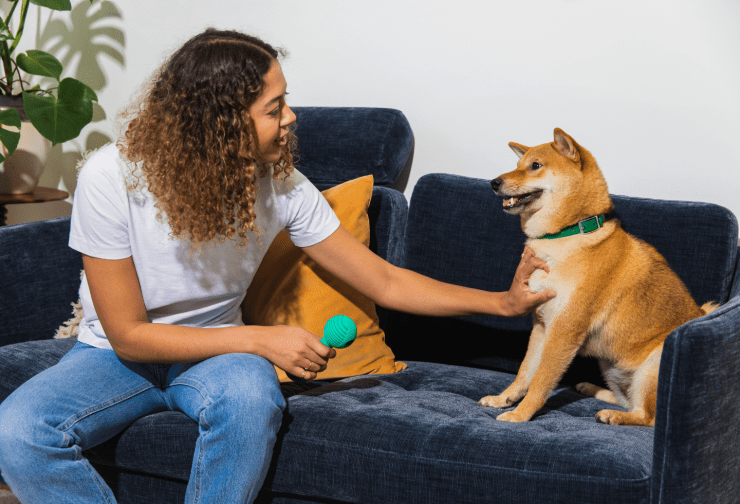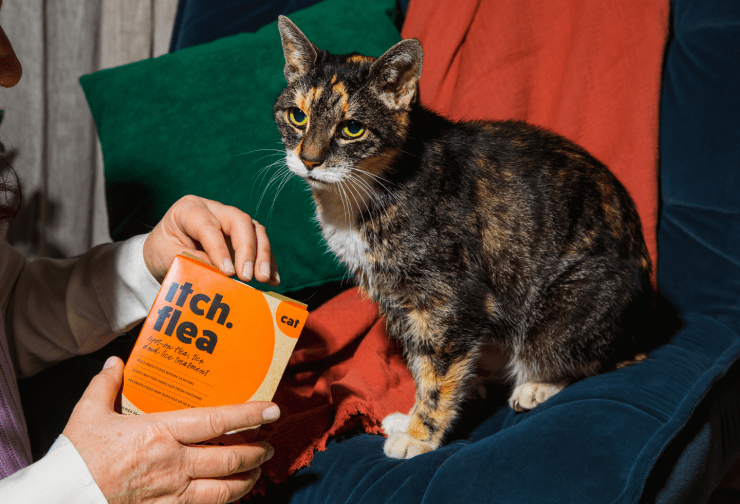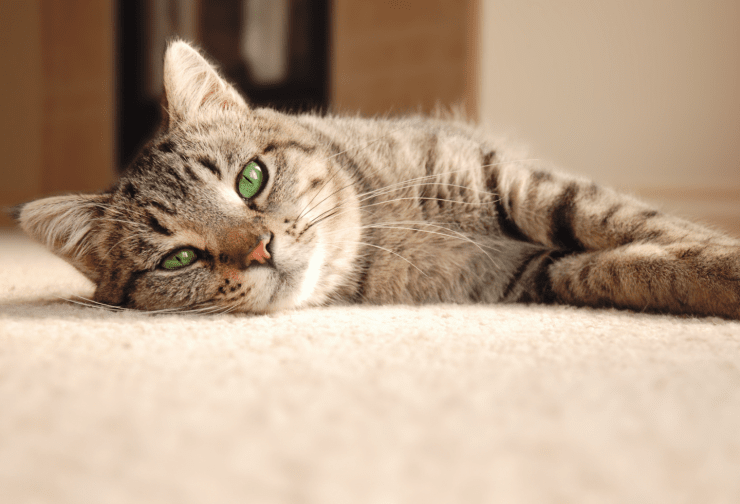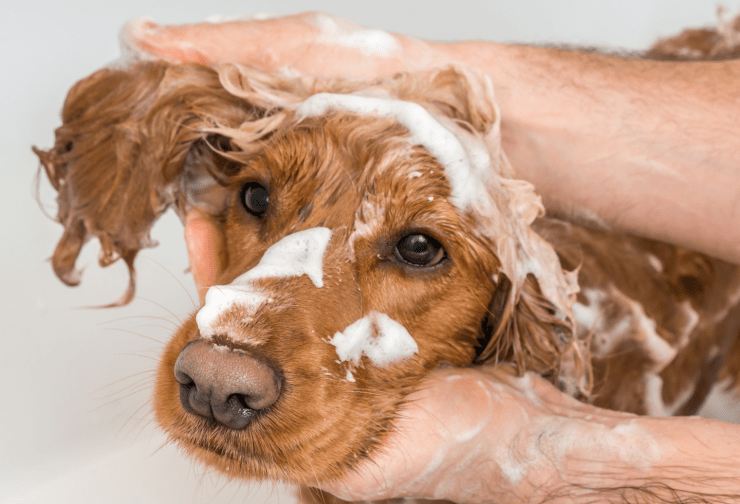All About Fleas
Everything you need to know about preventing fleas, managing outbreaks and eradicating infestations. So long, suckers! Explore our articles and learn more about the flea lifecycle, how to prevent an infestation and how to apply flea treatment correctly to your dog or cat.
Latest Articles
Flea
Treatment Issues

What to do if you can't get rid of fleas after treatment?
Dealing with a flea infestation can be a frustrating and exasperating experience, especially when you've tried everything but the fleas just won't seem to go away. It's a common scenario: you've diligently applied flea treatments, cleaned your home, and taken all necessary precautions, yet those persistent pests continue to bother your pets and invade your living space. If you find yourself in this situation, don't lose hope. Here we'll delve into the reasons behind failed flea treatments, how to identify signs of treatment resistance, and explore effective solutions to finally bid those relentless fleas farewell.
Flea
Treatment

What kills 100% of fleas?
Fleas are stubborn little blighters and without effective treatment, it can feel like they just won’t go away! In order to get rid of fleas for good, you need to know how to kill every last flea. Keep reading to find out vet-recommended tips for treating a flea infestation and most importantly, stopping them from coming back!
Flea
Prevention

How to stay safe from fleas
Fleas can make life miserable for both pets and people. They cause itching, irritation, and, if left unchecked, can spread rapidly throughout your home. The good news? You can stay clear of them with the right routine and treatment. Keep reading to find out what our vet recommends!
Flea
Identification, General

Top 5 flea hot spots in the UK
No one likes fleas. They’re small, quick, and irritatingly itchy. While fleas are a nationwide nuisance, recent studies and pest control reports show that certain regions in the UK have more of a flea problem than others.
So, if you’re wondering whether your county is a flea favourite or if you’re planning a trip and want to know what you might be up against, here are the five top flea hot spots in the UK!
Flea
General

Are pet flea treatments safe for humans?
When applying your pet's flea treatment, you might have come across yourself thinking 'Is this safe for me to touch?' or maybe even, 'Could I use this treatment on myself?'. No question is a silly question. Keep reading to find out the safety of pet flea treatment.
Flea
Treatment, General

The ingredient you need to kill fleas for good!
If you’ve ever dealt with a flea problem, you know it takes time, effort and a lot of patience. You treat the pet, you hoover like you’ve never hoovered before, you wash every blanket in the house… and still, weeks later, you spot another one of those tiny acrobats hopping about.
So, what’s the secret weapon? One ingredient that can make all the difference is S-Methoprene.
Flea
Treatment Issues

Why is my pet still scratching after applying a flea treatment?
Not all flea treatments are created equal. So it may be the treatment you used hasn’t done the job and you need to use something stronger. Itch Flea Treatment is a vet-strength, double action spot on treatment that not only contains Fipronil but also (unlike lots of other flea treatments), (S) Methoprene. Treatments that also include (S) Methoprene, like Itch Flea Treatment not only target the adult fleas feeding on your pets and kills them dead in 24 hours (and ticks in 48 hours), but also targets flea eggs and larvae, stopping the fast and furious flea life cycle dead in its tracks to stop new fleas developing.
We asked in-house Itch vet, Dr. Zoe Costigan to give us the lowdown on why your cat or dog might still be scratching after applying a flea treatment to your pet. Here's what she had to say:
“It’s fairly normal for there to be a period of hyperactivity amongst the fleas as the active ingredients in a flea treatment take effect and this can cause an increase in your pet scratching. It should settle down after 24 hours. If after 24 hours your pet continues to scratch, there could be other things going on. Your pet could be flea-allergic, it could have a skin infection or a hormone imbalance, or other conditions which can lead to itchiness.”
Flea
Treatment, General, Prevention

Understanding how fipronil and s-methoprene kills fleas safely and stops fleas multiplying
Nothing kills the vibe like finding out your pet has fleas. It starts with a scratch, then another, and before you know it, you have a full blown flea infestation on your hands.
But don’t panic. Fleas might be persistent little nuisances, but science is on your side. Fipronil and S-Methoprene are two active ingredients used in spot-on flea treatments. This chemical combination knocks out a flea infestation fast and stops any fleas from bouncing back. Keep reading to find out why you should ONLY use flea treatment with Fipronil and S-Methoprene!
Flea
General

What is the flea life cycle and how can you break it?
Fleas can turn into a massive headache for us, pet owners. Understanding the flea life cycle is crucial to effectively fighting off infestations and keeping your pets as well as your home flea-free. Scroll to see the flea life cycle, all four stages - egg, larvae, pupae and adult - and explore how you can break it to eliminate the pests.
Flea
Treatment Issues

Why can’t I get rid of fleas?
If you’re reading this, chances are that you’ve hoovered the carpets a thousand times, bathed your pet until he's eyeing you up suspiciously, sprayed every corner of the house, and yet - they are still scratching. Here’s why your fleas aren’t disappearing!
Flea
Treatment

Is it OK to reapply flea treatment after 2 weeks?
Can’t get rid of fleas on your pet? Fighting a flea infestation isn’t easy and requires a lot of patience. It’s understandable that you want to find a quick and easy way out to be flea free, but reapplying flea treatment, quicker than usual, to your pet might not be the answer. Keep reading to find out more and what to do in case you’ve applied twice in one month already.
Flea
Identification

Why do I suddenly have fleas in my house?
Fleas can come into your home at any point and stay there for as long as 6 months. Keep reading to find out what has probably brought fleas into your home and how to get rid of them.
Flea
Treatment Issues

How to get rid of fleas when nothing works
Right. So, you’ve vacuumed like your life depends on it, sprayed the entire house in flea spray, washed everything down to your soul – and yet, the little sods are still hopping about like they own the place. Welcome to the nightmare that is a full-blown flea infestation.
If you’re on the brink of shaving your pet bald and setting fire to your carpet, don’t panic just yet. Here’s what actually works when it feels like nothing does.
Flea
Treatment Issues, General

What is flea allergy dermatitis?
Something not all pet owners know about, but definitely should is flea allergy dermatitis, or FAD for short. If you’ve ever caught your dog chewing his back end like it owes him money, or seen your cat scratching like mad despite no visible fleas, this one’s for you.
Flea
Prevention

How do I make sure I don’t get a flea infestation?
Ah, fleas. Tiny, jumpy menaces that seem to appear out of nowhere and turn your home into an itchy nightmare. Whether you’ve got pets or not, flea infestations are one of those problems you really want to avoid. And the best way to deal with them? Stop them before they ever start. Here's everything you need to know about keeping the little blighters at bay.
Flea
Identification

Can pet fleas live on human hair?
Fleas – the tiny but an absolute nightmare critters that can turn your nice, peaceful household into a fest of itching and scratching. Fleas might be small in size, but they pack a punch when it comes to disrupting our comfort for us and our pets. Turns out they can hitch a ride not just on our pet's fur, but on our locks too... Scroll to find out how to get rid of fleas for good!
Flea
Treatment, Identification, Prevention, Treatment Issues, General

How to clean your home after a flea infestation
Ahhhh f*ck you’ve got fleas! Right, let’s get to work getting rid of these little blighters so you can sleep at night. Keep reading to find out how to clean your home properly after a flea infestation without losing your mind or your favourite rug…
Flea
Treatment

How to treat your home for fleas
If you’re reading this, you’ve probably found a flea on your dog or your pooch is scratching excessively, which only means one thing… fleas. You might be aware that you need to act fast and treat your pet, but do you also need to treat your house? The short answer is definitely YES! Keep reading to find out how to treat your home so you can say goodbye to fleas forever.
Flea
Treatment

What to do after applying flea treatment
Fleas are a nasty nuisance, so let’s make sure you kill them for good. Applying preventative treatment to your pet every month ensures any fleas that hop onto your pet are killed quickly. It’s important to stick to some key steps when applying flea treatment to your pet. Here at Itch, we like to call these the House Rules, and they make sure the fleas on your pet will be gone, for good.
Flea
Identification, General

Can fleas live on your furniture?
Fleas are a common nuisance in UK households, especially if you’ve got pets. But where are they hiding and what areas of the house should you be treating for fleas?
Yes, fleas absolutely can live on your furniture but they prefer warm, breathing hosts like your pet instead. Keep reading to find out how to get rid of fleas FOR GOOD!
Flea
Treatment Issues

Why is it so hard to deflea your pet?
Defleaing your pet can come with its challenge - this might be you struggling to keep your pet still when applying flea treatment or even still seeing wriggling fleas on your pet after treating them.Here’s why you might be finding it difficult - and what we recommend you do about it. Scroll to find out!
Flea
General

Flea facts: 7 things to know about fleas
EW, fleas! Tiny, persistent pests that can turn your pet's life into an itching nightmare and leave you feeling like you're in a battle you just can't win. Whether you're a seasoned pet owner or a newcomer to the world of fluff everywhere, understanding the ins and outs of fleas is crucial. Read on to learn our top 7 facts on fleas, how to prevent them and how to treat fleas if you do unfortunately get struck by an infestation.
Flea
Treatment

Flea Treatments - Spot on vs shampoo vs collar
Ah, the bane of every pet owner's existence: fleas. Those tiny, jumping nuisances can wreak havoc on both your furry friend and your home. Don’t worry, there are many options to remove fleas, but which is the best for you? Read on to learn all about flea treatments, what preventatives are out there and what we at Itch, recommend.
Flea
Identification

Fleas or mites? What is causing my dog's itchy ears?
If you've noticed your furry friend scratching at their ears incessantly, you might be wondering what's causing all that discomfort. Itchy ears can be a sign of various issues, but two common culprits are fleas and mites. Keep reading to know how to spot a flea vs a mite, and how to protect your pup from these pests!
Flea
Treatment

What are the active ingredients in flea treatments?
It's important to know what's in the flea treatment you are using and are the ingredients as good as they say they are? Flea treatment ingredients, Fipronil and (S) Methoprene, are the key ones! Scroll to find out if the flea treatment you're using is actually working...
Flea
General

New pet owners guide to flea treatment and prevention
We've create a tailored for new pet owners to navigate world of flea treatment and prevention so your puppy or kitten is happy and healthy! Keep scrolling treatment guidelines for adult dogs and cats, a specialised flea treatment schedule, and why preventative control is crucial.
Flea
Treatment

What type of flea treatment is best for your pet?
The market is brimming with flea treatment choices, and of course, each promise to be the magic wand that banishes those pesky fleas. Scroll to find how each treatment works and which is best for your furball.
Flea
Treatment

More than a quarter of a million dogs are allergic to fleas
Do fleas cause your pooch more hassle than just a bit of itching and scratching? Well if so, it’s a high chance they are having an allergic reaction. According to ESCCAP, (European Scientific Counsel Companion Parasites) just over 265,000 dogs are allergic to fleas*. Don’t panic though, we have all the information you need to gear up and fight those fleas, just keep reading!
Flea
Prevention

Fleas on holiday - How to keep your pet safe
Holiday mode for most of us is full relaxation and a time to recharge, but for our pets, it can be a bit more complicated. If you're taking your pet with you, there are a few things you need to keep in mind—fleas being one of the biggest concerns. These tiny critters are not only irritating for your pet but can cause some real headaches during what should be a stress-free break - carry on reading to find out!
Flea
Treatment

Can fleas live on bedding?
A clear sign of a flea infestation is your pet scratching more than usual, or finding the little blighters on your pet’s fur or in your home. Spotting fleas can be very simple but what about treating them? In order to get rid of fleas for good, you have to know where to the fleas will be. One of the common places they might be, is on your bedding. Scroll to find out how to zap dead all of fleas that are bothering your household and most importantly, how to prevent a full blown flea infestation.
Flea
Treatment

Can my pregnant dog use flea treatment?
If you've ever had the unfortunate experience of your dog picking up fleas, you'll know it's no fun at all. Not only do these tiny pests cause endless irritation for your dog, but they can also spread diseases and infest your home. Now, when your dog is expecting puppies, you might naturally have concerns about how to deal with fleas during her pregnancy. Is it safe to use flea treatment on a pregnant dog? Which treatments should you avoid, and how can you keep those pesky parasites at bay? Carry on reading to find out.
Flea
Treatment

Can my pregnant cat use flea treatment?
Fleas are no fun at all - especially if your cat is pregnant. Not only do flea infestations have the chance to transmit diseases, but if your cat is pregnant then her kittens may also be affected. It is important to know if using flea treatment is safe on your pregnant cat and which treatments you should avoid. Scroll to find out how to protect your cat and kittens from fleas.
Flea
Treatment

What is the most effective flea treatment for home?
Fleas are tiny, irritating pests that can turn your world upside down. Fleas live in a warm environment, close to hosts they can jump and feed on - so in your home with you and your pet, is the perfect place for fleas to thrive and breed. These little blighters can find their way into your home, by hitching a ride from you or your pet, and then hopping off as they enter the front door. So if you get hijacked by fleas, what’s the best flea treatment to treat your home and get rid of those pesky fleas for good? Keep reading to find out!
Flea
Treatment, General

Can fleas live on clothes?
Pet parents often think that finding fleas on a pet must mean they have got infected by a neighbouring cat or picked them up somewhere in the woods - whilst these assumptions aren’t wrong, there is another way fleas can infest your home… from you! Carry on reading to find out how fleas are nestling into your clothes and jumping on your pet.
Flea
Treatment

What is the best flea treatment for cats?
If you're a pet parent, you'll know there's nothing more frustrating than seeing and hearing your cat scratching away furiously. Fleas are an absolute nuisance, but thankfully, you can get rid of them for good with the right knowledge. Keep reading to be a flea expert and choose the best treatment for your cat!
Flea
General

Is it your fault if your cat gets fleas?
For any cat riddled with fleas, it's unpleasant for the poor kitty and unpleasant for any owner to watch. With all the itching and scratching, you wouldn’t be the first owner to blame yourself for your cat getting fleas. But are you responsible? Let’s find out…
Flea
Treatment, Prevention

How to kill fleas fast!
Fleas can catch any pet parent off guard, so knowing how to get rid of them and preventing them from coming back is extremely helpful! Whether you are tackling a flea infestation now or cluing yourself up for a potential future pest attack, this guide has the low down on all things fleas. Keep reading to get rid of fleas on your pet FAST!
Flea
Treatment, Treatment Issues

Do I need to treat my house if my dog has fleas?
No pet owner wants to deal with fleas. Knowing what areas to treat and when to use treatment is key to eradicating a flea infestation. You might have de-fleaed your pet, but have you thought about treating your home? Keep reading to find out how to kill fleas QUICKLY!
Flea
Treatment

How to apply Itch Flea treatment to your dog
Amazing news! When applied correctly, Itch Flea Treatment for dogs is 100% fast and effective at killing fleas on dogs and puppies!
However, the 'when applied correctly' bit is pretty important.
We know it's not always that easy, so we've put together a quick guide on the best way to apply Spot-On Flea treatment to your dog or puppy.
Flea
Treatment

How to apply Itch Flea treatment to your cat
Great news! When applied correctly, Itch Flea treatment for cats is 100% fast and effective at killing fleas on cats and kittens!
However, the 'when applied correctly' bit is quite important…
We know it's not always that easy, so we've put together a quick guide on the best way to apply Spot-On Flea treatment to your cat or kitten.
Flea
Treatment Issues, Treatment

Does vinegar kill fleas?
Spotted a black speck? It might be a flea. If it is, you need to act fast! Don’t rush to the kitchen cupboards though, vinegar as a natural flea killer isn’t going to do much. Keep scrolling to find out why and what our experts would recommend instead…
Flea
Identification, General

What are dormant fleas?
Fleas are tiny, unwelcome guests that seem to appear out of nowhere, wreaking havoc on our poor pets and occasionally giving us a nip too. But what happens when you think you’ve dealt with them, only for them to stage a surprise comeback weeks (or even months) later? Keep reading to find out!
Flea
General

Is it OK to touch a dog with fleas?
Uh oh! You've pet a dog with fleas? Don't worry, you should be fine but you need to make sure to follow some key steps to avoid getting a flea infestation. Scroll to find out!
Flea
General

Can fleas eventually kill a pet?
Ah, the pesky little critters known as fleas - the bane of every pet owner's existence. These minuscule blood-suckers may seem insignificant at first glance, but don't let their size fool you. Fleas are not just annoying; they can pose serious health risks to our beloved furry friend if left unchecked.
Fleas are tiny insects that thrive on the blood of mammals, including our cherished pets. They can easily infest our homes and latch onto pets, nestle in their fur and cause a handful of problems if not dealt with promptly and properly.
Flea
Identification

Flea droppings - A sign of infestation?
Ah, the notorious flea. Just the thought of them is enough to make your skin itch. If you're a pet owner or have ever encountered these tiny, pesky critters, you know the struggle is real. But what about flea droppings?
Flea
Identification

What are the black specks in my pet's fur?
Have you noticed some specks in your pet’s fur, do they look like black dirt? We’ll tell you all you need to know here!
Flea
Treatment

Flea injections for cats and dogs
There are many many options for flea treatment these days, which can be overwhelming to say the least! Keep reading to find out about flea injections and whether it's the best choice for your pet.
Flea
Identification

What does a flea bite look like?
Not sure if your pet or even yourself have been bitten by fleas? Read here to see exactly what a flea bite looks like and how to prevent it!
Flea
Identification

Are fleas and ticks the same thing?
If you've ever found yourself wondering whether fleas and ticks are the same thing, you're not alone. These tiny creatures often cause confusion due to their similar size and the discomfort they bring to our furry friends. Scroll to find out the difference between fleas and ticks!
Flea
Identification

How to prepare for flea season this spring
It's Spring which means it's nearly that time of the year again... Peak flea season. Most pet owners don't realise that fleas are out and about all year-round, but as it starts to warm up, fleas come out in full force. Keep reading to find out how to avoid fleas this Spring!
Flea
Prevention

Fleas aren’t just for summer: Why winter flea treatment is important
'Fleas can't bother me in winter?' Think again. Flea infestations can certainly happen in winter months, especially as we crank up the heating and our homes become warm and toasty. Let's dive into why fleas are a year-around problem, why it is important to maintain flea treatment in winter and most importantly, how to prevent them for good!
Flea
Identification

How do cats get fleas?
Fleas are way more than just a bit of itching and scratching, to really understand how cats get bitten by fleas, let's talk flea lifecycle, flea hideout spots and most importantly, discover how to prevent fleas hitchhiking a ride on your cat.
Flea
Identification

How do dogs get fleas?
Your dog might be suffering with a flea infestation or you are just worried and want to avoid fleas full stop. Keep reading to find out where fleas come from, why they like our doggies so much and how to get rid of fleas for good!
Flea
Treatment

How to kill fleas for good
The persistent presence of fleas can have a knack for making our pets' lives itchy and uncomfortable. But don't panic! We are experts in pests that bother your pet. Keep reading for our vet-recommended tips and treatment options to get rid of fleas for good....
Flea
Treatment

Signs, symptoms and treatments for fleas
We're tackling a topic that every responsible pet owner should be well-versed in – fleas. Join us as we explore the signs, symptoms, treatments, and prevention strategies to ensure your pet's well-being and your home's peace. Let's dive into the fascinating world of fleas!
Flea
General

Do pet fleas bite?
Ah, fleas. Those tiny, jumpy, unwelcome house guests that seem to have an uncanny ability to turn even the most well-groomed pets into scratching, wriggling messes. If you've ever found yourself frantically Googling "do pet fleas bite?" at 2 AM while scratching a mysterious itch on your ankle, then welcome to the club. Read on to find out where and how fleas bother you and your pet.
Flea
General

‘Flea Gate’: How Boris Johnson should have handled Downing Street
Annoying, blood-sucking creatures in Downing Street? - And no,we’re not talking about politicians. In Liz Truss’ recently released memoir, she claims Number 10 was infested with fleas thanks to Boris Johnson’s poor little dog, Dilyn. Clearly he didn’t have a subscription to Itch. Showing us the ex Prime Minister was clueless in the face of a flea infestation. We’re here to help you get more clued up than Bojo. Here’s what to do if you find yourself the unlucky target of a flea infestation, and more importantly, how to stay one step ahead.
Flea
General

Can pet fleas live on clothing?
Fleas are a nuisance of the best times when on your beloved pets, but even more so if they make the leap to you! This article gets you up to speed with the flea lifecycle, answers the burning question of can fleas live on clothing? And how to get rid of the blighters and stop them making an unwelcome return!
Flea
Treatment

What to do if your pet has fleas and sleeps in your bed?
Fleas can turn your cosy home into an itchy battleground, especially when they decide to share your bed with your furry friend… three’s definitely a crowd! This article gives you all the best tips for how to deal with a duvet stealing pooch who’s also fighting fleas!
Flea
General

Can cats be allergic to fleas?
Fleas can turn a cat's peaceful existence into an itchy nightmare. While the mere thought of these pesky critters is enough to make any cat owner shudder, it's crucial to delve into the impact fleas can have on our feline friends. Keep reading to find out how fleas affect cats, how to spot them on your furry companion, and the pressing question – can cats be allergic to fleas?
Flea
Identification

How to spot fleas in your carpet
Spotting fleas in your carpet may seem like a tricky task, given their size and knack for hiding. There's a few hacks to spot these tiny creatures, so let's dive into what fleas look like and most importantly, how to get rid of them!
Flea
General

Can dog fleas jump to humans?
Fleas the tiny, agile creatures that can turn a peaceful pet-filled home into a buzzing hub of discomfort. If they’re on your dog, does that mean they can get onto you too! Scroll to find out more.
Flea
Identification

Can a puppy get fleas?
The wonderful world of puppies… the boundless energy, the adorable antics, and, yes, the potential for pesky fleas. Fleas are tiny but mighty nuisances that can make your puppy's life less enjoyable. This article explores the possibility of puppies getting fleas, how it can happen even if they don't venture outdoors, and, most importantly, how to prevent and treat these unwanted critters.
Flea
Treatment

How long does it take to get rid of fleas in your house?
So your home has some lovely unwelcome guests... Fleas. Your cat or dog is more than likely scratching incessantly, or maybe you’ve noticed tiny, jumping critters making themselves a bit too comfortable on your sofa. Either way, you've got a flea infestation you want it gone – and fast! Keep reading to see how to quickly regain control of your home and for vet-recommended tips on speeding up this process.
Flea
General

How do you get fleas in your house?
Has your pet got an itch that just won’t go away, or worse you’ve been itching yourself?! Well I hate to break it to you but it might be fleas. But how have they found their way into your home?
Fleas are the stuff of nightmares, not just for pets but for homeowners too. Once they’ve got in, they multiply fast and before you know it you have a full blown infestation. Keep reading to find out how to get rid of fleas for good!
Flea
Treatment

Why you should continue to use flea treatment in winter
We all know fleas love the heat! But sadly this doesn’t mean they disappear in the winter… This article tells you everything you need to know about those pesky parasites during the colder months.
Flea
Treatment

Do natural flea treatments actually work?
Fleas, the tiny terrors that can turn your pet's life into an itchy, uncomfortable ordeal. When faced with a flea infestation, many pet owners seek solutions that are safe and natural. But do these natural flea treatments actually work? In this blog post, we'll discuss the world of natural flea remedies, exploring common options, assessing their effectiveness, and discovering which ones are worth considering. We'll also introduce you to Itch Flea treatment and explain why it’s so fab as an effective preventative treatment. By the end, you'll have a clearer understanding of whether natural flea treatments are the right choice for your furry friend.
Flea
Treatment

Does flea shampoo actually work?
Fleas can turn your pet's life into a scratching frenzy. When you're faced with a flea infestation, you want a solution that works, and fast. One option many pet owners consider is flea shampoo. But does flea shampoo actually work? In this blog post, we’ll explore shampoos, how they are supposed to work, their effectiveness, and alternative methods for treating fleas. By the end, you'll have a clearer understanding of whether flea shampoo is the right choice for your furry friend.
Flea
Treatment Issues

Why does my pet keep getting fleas?
Fleas – they're the pesky little critters that can turn your pet's life into an itchy nightmare. If you've found yourself repeatedly dealing with fleas on your furry friend, you're not alone. If you’re sat wondering why does my dog keep getting fleas? Why does my cat keep getting fleas? Then wonder no more! In this blog post, we'll dive into the world of fleas, exploring what they are, what attracts them to your pet, and the various factors that contribute to this persistent problem. We'll also discuss how to treat fleas permanently, with a focus on Itch Flea treatment to help you prevent and protect your pets. By the end, you'll be armed with the knowledge to keep those fleas at bay for good.
Flea
Treatment

Should you bathe a pet with fleas?
Fleas, the bane of every pet owner's existence. When you suspect your furry friend has these tiny terrors, you might wonder if giving them a good bath will do the trick. Should you bathe a pet with fleas? In this blog post, we'll dive into this question, exploring the nuances of dealing with fleas and bathing your pet. We'll discuss whether your pet actually has fleas, the pros and cons of bathing them, what to do after treatment, and how to prevent future flea infestations. By the end, you'll have a clearer picture of when and how to bathe your poor flea-afflicted pet.
Flea
Treatment

How to use a household flea home spray
So, you’ve found fleas on your pet. Bad news: this means that they’re also highly likely to be in your home too.
The good news is that the combination of your gold-standard, Itch Flea treatment and Itch Flea Home Spray will get rid of those fleas in no time.
Itch Flea Home Spray as a one-off will kill adult fleas that are in your home. It will also prevent any new fleas from hatching for up to 12 months.
Don’t forget, once you’ve finished annihilating the adult fleas in your home, you need to stay up-to-date up with your monthly Itch Flea treatment for your cat and Itch Flea Treatment for your dog to keep your home and your pet flea-free forever.
Flea
Treatment

How to get rid of fleas
Fleas – those pesky little insects that can turn our furry companions' lives (and ours) upside down. If you've ever experienced a flea infestation, you know just how frustrating and uncomfortable it can be. These tiny creatures are not only a nuisance but can also pose health risks to both pets and humans. In this comprehensive guide, we'll explore the world of fleas, from understanding their origins to effective methods for getting rid of them. So, if you're tired of the itching, scratching, and constant battle against the blighters, read on to discover how to reclaim your home and your pet's comfort.
Flea
Treatment

What is the best flea treatment for dogs?
If you're a dog owner, you’ll know that fleas are an absolute nightmare. These tiny pests can turn your pup’s life—and yours—into an itchy misery. But don’t worry! With the right flea treatment, you can keep your furry friend flea-free and happy. Keep reading to be a flea expert and choose the best treatment for your pooch!
Flea
Identification

How long do fleas live & Do you still have fleas after treatment?
Fleas, those tiny but persistent pests, can be a real nuisance for pets and us owners. When you discover a flea infestation, you want them gone, pronto! But how long do fleas live, and do you still have fleas after treatment? In this article, we'll explore the lifespan of fleas, what happens to them after treatment, whether all treatments kill fleas immediately, and what to do if you can't seem to get rid of these pesky little critters. By the end, you'll have a better understanding of the flea lifecycle and how to effectively deal with flea infestations… easy peasy, bye-bye fleasy!
Flea
General, Insights

Where can you buy flea treatment?
Most pet owners believe you can only get flea treatment from the vets and even then, it should be prescribed. We’re here to tell you that’s not correct and you have a choice over what flea treatment you give your cat or dog. Keep reading to find out what the best flea treatment is for your pet and where you can buy it from!
Flea
Prevention

How to prevent fleas in dogs and cats
Fleas, those tiny, relentless creatures, can turn into a major annoyance for our beloved pets. Not only can they cause discomfort with their itchy bites, but they can also lead to more serious health issues if left unchecked. The key to keeping your furry friends flea-free is prevention. In this post we'll focus on why your dog or cat might keep getting fleas, what to do when your pet itches but you can't see fleas, and most importantly, effective strategies for preventing fleas in the first place. Let's get started by creating a comfortable and flea-free environment for your furry companions.
Flea
Identification

Can an indoor cat get fleas?
While most of us associate fleas with outdoor adventures, but is that always the case? The answer is yes, an indoor cat can get fleas! Fleas are agile little creatures, and even the most pampered indoor kitties are not entirely immune to them. Keep reading to find out how to prevent and treat these pesky invaders.
Flea
Identification

What do fleas look like?
Fleas, those pesky little creatures that can cause so much trouble for our beloved pets, are often hard to spot with the naked eye due to their tiny size. However, understanding what fleas look like is essential for effective prevention and treatment. Here, we explore the appearance of fleas, including pictures of fleas, their size, and the distinct features that differentiate dog fleas from cat fleas. We will also take a closer look at flea eggs and highlight other bugs that may resemble fleas, helping you to identify and deal with these nuisances.
Flea
Identification

5 ways to spot fleas!
Ah, fleas – the uninvited guests who think your pet’s blood is theirs to munch on. These tiny nuisances are more than just a bother; they’re a full-blown, hopping headache. But how can you tell if you’re dealing with fleas? Well, whether you’ve got a cat, a dog, or you’re just a worried homeowner, here are five tried-and-tested ways to spot the little blighters.
Flea
Treatment

Why am I seeing more fleas after applying treatment to my pet?
Fleas seem to appear out of nowhere and cause endless scratching, biting, and discomfort—not just for your furry friend but for you as well! You’ve done the responsible thing, applied the flea treatment, and expected things to improve. But wait, now there seem to be more fleas! What’s going on? Don’t worry; you’re not alone. Let’s dive into this scratchy conundrum and uncover what’s happening.
Flea
Treatment Issues

Can you apply flea treatment wrong?
Your pet is still scratching after treatment? Spotted a flea even though you protect your pet? If this sound familiar, it’s likely your pet's flea treatment isn’t effective. In most cases, this is due to incorrect application of the product. Keep reading to find out if you’re the problem, not the treatment…
Flea
Treatment

How often should you apply flea treatment to your pet?
Most people know that it’s important to treat your pet for fleas, but how often should their flea treatment be applied and why is this crucial to preventing infestation? Keep reading for top tips from Head Vet at Itch, Dr Costigan on flea treating your cat or dog.
Flea
Identification, Prevention

Can fleas survive the cold?
Sorry to burst your bubble but fleas aren’t just a summer problem. Whether you are in peak infestation or have dealt with pests before, it’s wishful thinking to want fleas to disappear as the temperatures drop. Scroll to find out the best way to kill fleas and get rid of them for good!
Flea
General, Treatment

Can my pet catch fleas from grass in my garden?
Fleas are one of those pests that seem to pop up out of nowhere, and cause absolute chaos. When this happens, as pet parents, our first thought tends to be, how has this happened? It’s not always straightforward trying to find how your pet has got fleas, but this answer could be right under your nose (and by this, we mean outside your back door)...
Flea
General

When is peak flea season?
As pet owners, we all know that fleas can be a pesky and persistent problem. These tiny parasites can infest our furry friends, causing discomfort and potential health issues if left unchecked. Fleas are most active during certain periods of the year, which we commonly refer to as the "peak flea season." Here, we dive into the crucial information you need to know about when fleas are most active, when they come out, and whether they prefer hot or cold weather conditions. Armed with this knowledge, you'll be better equipped to protect your beloved pets and your home from these bothersome critters.
Flea
Identification

How do you know if you have fleas?
Not sure if you’ve found a flea or a black speck on your pet? Fleas are not always easy to detect, but they are quick to turn your world upside down. If left untreated, fleas can cause full infestations, leaving you, your family and your pet itchy, frustrated and uncomfortable. Knowing you’ve got fleas is the first step to getting rid of them for good! Keep reading to be a hop ahead of these pesky pests.
Flea
General

Does humidity affect fleas?
Ah, fleas—the creatures with a mission to make your home a battlefield. They are notorious for causing itchy bites, relentless reproduction, and their ability to spread quicker than you can say the words ‘f*ck off fleas’. If you’ve ever had a flea infestation, you’ll know this phrase all too well.
So, fleas love a warm and humid environment. Like most, they have their preferences when it comes to climate. Scroll to see what conditions lead to flea infestation and our tips to staying flea-free forever.











